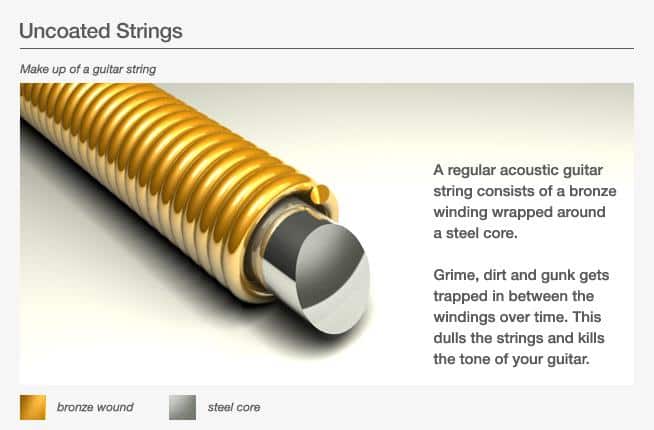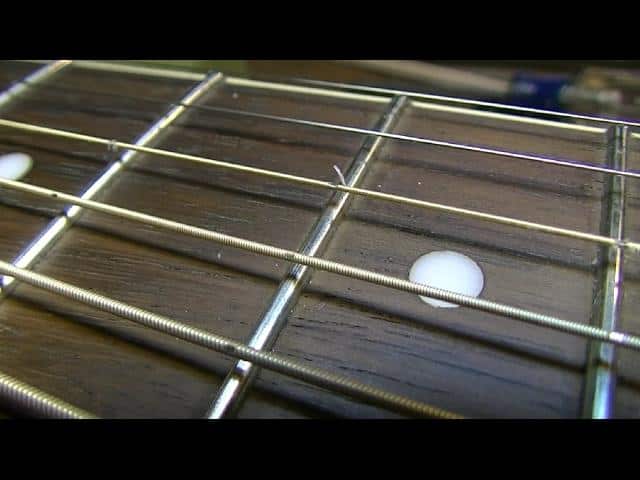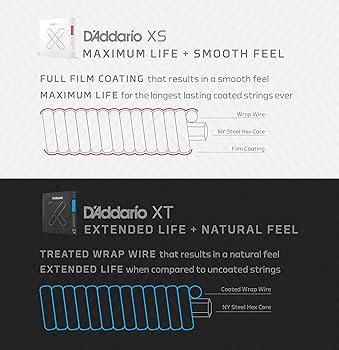Picture this: you’re just about to hit the high note of your favorite song on your cherished guitar, but the sound that comes out is no longer crisp. Instead, it falters, sounding dull and ironically flat. Despite the best techniques and years of guitar playing experience, your performance is marred. What happened? The answer could lie in your guitar strings – coated vs uncoated.
My name is David Garcia. For years, I’ve been building and researching stringed instruments, finding nuances in their constructions that can dramatically shape the sound they produce. Because of my background, I’ve come to realize that the choice between coated and uncoated guitar strings, often taken lightly, can be integral to the sound quality of your instrument.
In this comprehensive comparison, I’ll use my expertise to guide you through the world of guitar strings. We’ll delve into the nitty-gritty details of the strings—why they differ, the idiosyncrasies in their sounds, and how to make an informed decision when considering what type of string is best for your instrument. Together, we will unearth the truth about the great debate of coated versus uncoated guitar strings. So, let’s get ready to strum our way into this comprehensive comparison of coated vs uncoated guitar strings!
What are Coated and Uncoated Guitar Strings

As an experienced luthier with particular expertise in Elixir strings, I’ve long been intrigued by the difference a mere coating can make to a guitar string’s performance. What sets coated and uncoated strings apart, you may wonder? What factors contribute to a musician’s choice between the two? Well, let me enlighten you on this fascinating topic, drawn from my own experiences and knowledge.
Did you know that the coating on guitar strings was initially introduced to prevent corrosion? Yes, it’s true. In the simplest terms, coated guitar strings started as a practical invention, a shield against the specter of rust that guitarists once grappled with. Manufacturers had the rescue instinct to create coated strings, imbued with a protective layer, predominantly to fend off the corrosive impact of sweat, grime, and ambient humidity. Corrosion is a key culprit behind tunes falling flat, strings snapping unexpectedly, or the instrument losing its brightness.
So, when a guitarist picks up a set of coated strings, what they’re really clutching is a blend of innovation and necessity—a compound result of time, research, and a devoted desire for longer-lasting resonance. But don’t be misled into thinking that the advantages of coated strings end at rust prevention. Such a coating has another remarkable consequence—its silky smooth texture literally glides under your fingers, redefining playability.
Uncoated strings, on the other hand, provide an entirely different experience. With these, there’s no barrier between your fingers and the raw, pristine wire – it’s like holding a piece of music in its most pure, unadulterated form. Uncoated strings deliver a sharper, brighter tonality, offering a crisp sound that many musicians swear by, especially in genres where high treble and distinct articulation are crucial.
Whether it’s the mellow, smooth sound of a coated string or the brilliant, bold tone of an uncoated one, each type has its unique charms. My personal preference? It changes with the seasons, the guitars, and even the mood of the music I play. After all, the ultimate test of a string lies in how it responds to the player’s touch and style, adding an undefinable sparkle to each musical note.
In the upcoming sections of this comprehensive comparison, we’ll delve deeper into the specific differences between coated and uncoated strings, the factors influencing our choice between them, and where you can buy the finest of each type. Stick around, as the journey into the world of strings, both coated and uncoated, gets more engaging from here!
How Coated and Uncoated Guitar Strings Differ

As a seasoned musician, I can tell you that the intricacies of guitar play extend deeper than the ragtag chord progressions of a campfire strummer may reveal. Over the years, I’ve found that even something as seemingly simple as the type of strings you use can significantly impact your sound and overall playing experience. One fundamental choice that’s always presented in this realm concerns whether to go for coated or uncoated strings.
Why would some musicians swear by coated strings while others strictly stick to uncoated ones? The answer lies in understanding the unique characteristics of these two string types. To give you a clear answer, I’ll delve into the distinctions between them, by applying the knowledge I’ve amassed over years regarding string lifespan, durability, and the intricacies of flaking.
At their most basic, coated strings have a thin layer of polymer applied over the wire windings, while uncoated strings do not. This coating serves as a barrier against environmental factors like sweat, oils, and dirt, all of which can drastically shorten your strings’ lifespan and deteriorate their sound. Uncoated strings, on the other hand, are just as they sound — raw, untreated, and incredibly sensitive to these same elements.
The most noticeable difference between coated and uncoated strings is felt in the tonal quality. The coating process inevitably damps certain higher frequencies, resulting in a warmer and less bright tone from coated strings. Some players prefer this subtler sound, arguing that it gives the music an aged or ‘mellowed’ character that’s hard to achieve with an uncoated string.
On the flip side, uncoated strings produce a crisper, more brilliant tone and pack a bigger punch in terms of volume. The absence of any coating allows an unfiltered connection between the string and your fingers, which many purists argue yields the truest and most authentic guitar sound. If you’re after a sharp, pronounced tone, then uncoated strings could be your best bet.
The durability and lifespan of your strings are other factors to consider. The protective layer of coating gives the strings resistance against corrosion, thus extending their usable life. Conversely, the authenticity of uncoated strings comes with a trade-off. The lack of a protective layer makes them vulnerable to wear and tear, meaning you’ll need to replace them more frequently if you want to maintain top-quality sound.
In conclusion, the choice between coated and uncoated guitar strings comes down to what you value most as a musician. Is it the long-lasting, mellow tones of a coated string, or the crisp authenticity and raw connection of an uncoated string? I hope this insight, drawn from my personal experiences and knowledge, will make this decision a more informed one for you.
To draw a firm line on what’s best would be misleading as it very much depends on your personal preferences, playing habits, and of course, the music you’re seeking to create. Remember that music, like all forms of art, thrives through experimentation, so I encourage you to try both and see which one resonates most with your sound.
Why Choose Coated or Uncoated Guitar Strings

As we delve deeper into the intricacies of coated and uncoated guitar strings, one question inevitably arises – why should you choose one over the other? After years of experimenting with both types of strings, I have gained valuable insights that I believe will help you make an informed decision tailored to your specific needs and playing style.
What if I told you that the type of string you use could drastically alter your playing experience? The truth is, the distinctions between coated and uncoated strings stretch far beyond simple aesthetics or initial perceptions.
Let’s start with coated strings. If longevity and a consistent tone are high on your priority list, coated strings might be the perfect fit. They offer an extended life span, thanks to their protective coating, significantly reducing the effects of oils, dirt, and sweat – the usual culprits behind premature string degradation. I’ve had times when my coated strings lasted weeks longer than their uncoated alternatives, which, in the long run, meant fewer string changes and more practice time.
If you’re a player who loves the feel of natural strings on your fingers, or if you are chasing that traditional, bright tone, then uncoated strings might be the right choice for you. After multiple gigs and rehearsals, I also found that uncoated strings tend to produce a slightly louder output, attributing it to the raw metal of the string engaging more directly with the pick or finger.
Not all coated or uncoated strings are created equal. Personal preference and playing style play a crucial role in determining the ideal string for you. For example, as a blues player, I leaned more towards uncoated strings as they delivered that raw, gritty tone which complemented the genre perfectly. However, when I dabbled in pop and softer genres, I found that coated strings provided a smoother, more rounded tone that blended seamlessly.
There is no definitive answer as to whether coated or uncoated strings are superior. This choice depends heavily on your individual preferences and playing style. The type of music you play, how often you perform, and even the climate of where you live can all influence which strings will be more suitable for you. I encourage you to try out both kinds for yourself. Remember, finding the right strings is a journey of exploration, and there is no ‘one-size-fits-all’ answer!
The answer to ‘why’, lies within you. So unleash that passion for music. Explore, play, listen and determine what brings out the best in your guitar — and in you, as an artist. In the next section, we will discuss when to consider using coated or uncoated strings to help you further in your decision-making process. Let’s delve into that journey together!
When to Consider Coated or Uncoated Strings

Let’s get to the crux of it; figuring out the ‘When’. ‘When’ should you opt for coated or uncoated strings? Having spent decades playing and exploring the world of strings, I’ve learnt that timing is everything. Not only in music but in deciding the type of strings that your guitar obsesses over. What works for one musician, might not be the same for another.
Picture this; you’re preparing for an upcoming tour or a series of performances. You need your strings to sound vibrant and fresh for longer, and you don’t have the luxury of time for frequent string changes. What do you do?
Can your strings really influence the longevity of your guitar’s performance? Yes, they can and they do. In such scenarios, coated strings are your best bet. Their extended lifespan and reduced maintenance come in handy. I’ve experienced this first-hand during my tours. A fresh set of coated strings at the start of a tour helped me keep my performance at its peak consistently, without worrying about string changes.
On the other hand, if you’re heading into a studio to record your next track, the authenticity of sound is paramount. Any added layer can take away from the pure, raw tone you might be chasing. This is where uncoated strings come into play. On one of my recording sessions, I switched to uncoated strings and witnessed the richness and organic undertone in my guitar’s voice.
Understanding your playing environment, your guitar’s requirements, and your personal preferences could be defining factors. If you’re one of those players who like to have a sweat-fest while rocking out your guitar, you need coated strings, as they are more resistant to sweat and grime.
Coated or uncoated, it’s an equation defined by what you seek in your music journey. What works best for you might be a matter of trial and error, and that’s perfectly fine. After all, discovery is an integral part of being a musician!
In a nutshell, coated strings are ideal when you seek longevity, while uncoated ones are perfect for capturing authentic tones. My experiences have taught me so. Your journey, on the other hand, might inform a different story. But remember, the core essence remains the same; your strings can and will influence your guitar’s performance. It all boils down to the ‘When’.
As we move forward to the next section, I will walk you through the ‘Where’ as we delve into the world of finding the best coated and uncoated strings, guided by not just my experience but the collective wisdom of the music community.
Where to Buy Best Coated and Uncoated Strings

As a frequenter of music stores and an ardent online shopper, I like to think I have the insider’s scoop when it comes to purchasing strings, be they coated or uncoated. Over the years, my extensive experience with different brands like Elixir and Slinky RPS Titanium has informed my reliable set of go-to sources. Your local music store can be a treasure trove of brands and types. The store owners often carry valuable first-hand knowledge of their products and can offer personally catered advice. Yet, I must confess, my top recommendations are now found across the digital landscape.
Only a true musician understands the importance of finding the perfect set of strings. A dedicated guitarist would dive deep into the realm of online shopping to source the ideal match. The beautiful thing about online shopping is that it offers an array of exclusive options sometimes not available in your local store. Websites like Guitar Center and Sweetwater are well-stocked with a wide range of coated and uncoated strings catering to different genres of music and playing styles. Their detailed reviews and ratings make the decision-making process a breeze.
In my personal experiences, Amazon has been a surprisingly great source too. Not only does it stock individual strings and full sets from high-end brands like Elixir, Slinky RPS Titanium, and more, it also serves as a platform for lesser-known manufacturers to reach a wider audience. It’s also a place where you can read authentic reviews from fellow musicians and guitarists. In addition, the delight of stumbling upon a fantastic uncoated string set from a new brand during one of my late-night scroll sessions is pure gold.
Beyond online platforms, social media groups align with specific styles and gear, and these groups can also provide handy buying advice and recommendations. It’s almost like having a personal-shopping assistant for free. But remember, the perfect strings for another may not be the perfect ones for you. It’s always about matching your unique needs to the right product. Above all, where you buy from is just as crucial as what you are buying, as it ensures you get only the best of what is available out there.
FAQs
What is the difference between coated and uncoated guitar strings?
Do coated guitar strings sound different from uncoated strings?
Which should I choose between coated and uncoated guitar strings?
Conclusion
Reflecting on my journey as a musician, an engineer, and a luthier, I’ve wrestled with the guitar strings conundrum for years. It was only after truly understanding the make-up and varied characteristics of both coated and uncoated guitar strings, that I could make the most suitable decision. We’ve explored these intricate details together, considering all aspects of their construction and effect.
After diving deep into the world of guitar strings, the question remains: Coated or uncoated? Well, remember, there’s no definitive answer. It all depends on your unique requirements, personal preferences, play-style, and the genre you’re catering to.
Coated strings come with distinctive advantages of longevity and consistency. They combat the factors of corrosion and rust effectively, providing a stable sound quality over time. For those of you who don’t appreciate the frequent string changing process, or are travelling musicians, these could prove a boon.
Nevertheless, uncoated strings do have their unique charm. Offering a more traditional feel, they provide a brighter and richer tone, especially favored by those into acoustics. If the quintessential raw touch and tone are what move you, uncoated strings should be your calling.
As you venture into the world of music, my advice would be to experiment. Try both, compare your experiences, and see which fits into your musical journey best.
In the end, the perfect guitar string doesn’t exist. It’s all about what’s perfect for your guitar, enhancing its performance while complimenting your artistry. The intervals, the strums, the chords, each would have their own tale to tell. Your strings are the heart of your guitar. Choose wisely, play passionately.